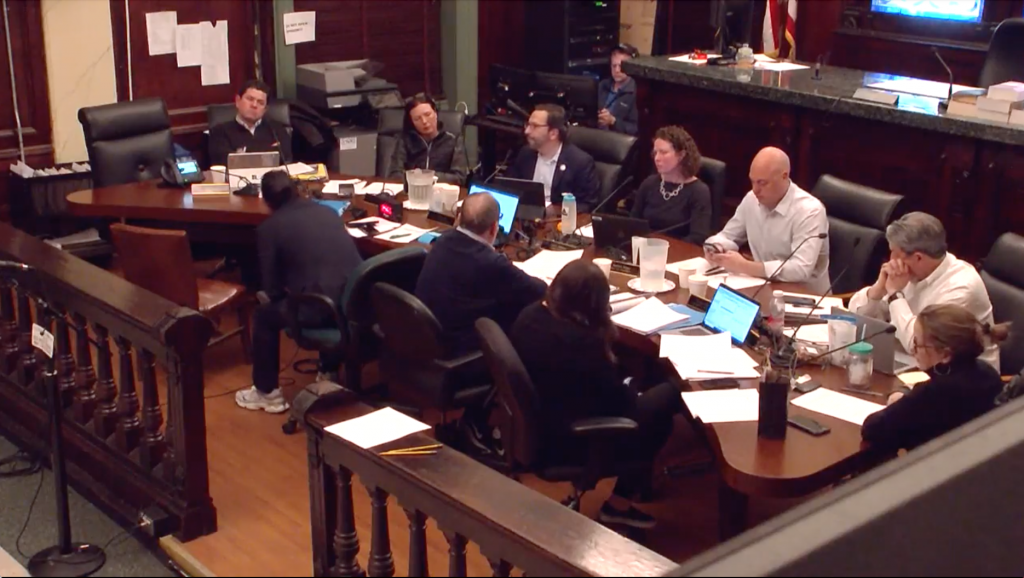In another narrow vote, the Hoboken City Council okayed a rent control ordinance amendments on second reading after being introduced last month.

By John Heinis/Hudson County View
“Any changes to the rent control laws do not help the mom and pop landlords. Most of us are senior citizens on a fixed income. We depend on rent to help us live. But you put forth rules that cap us at five percent while the city is raising [taxes] roughly six percent and the school board roughly six percent tax increase,” said Rose Marie Markle.
“If the CPI falls below one percent, we get absolutely nothing. We still have bills to pay and increased fees to register our properties. Who’s here to represent us? I see no representation … We built this town and we’re being squeezed out.”
An ordinance was approved in February by a 5-4 vote that included a variety of changes such as changing the initial base rent yet to October 1st, 1985 and reducing annual rent increases from 7.5 percent to 5 percent.
Several landlords and tenants spoke out against the measure then and urged the council to consider amendments such as rent permitted to be charged under the rent control ordinance, leaving rent control calculations up to the rent control office (with tenants able to receive the calculations upon request) – among other things.
This prompted 4th Ward Councilman Ruben Ramos and 6th Ward Councilwoman Jen Giattino to sponsor local legislation that included some of the aforementioned changes.
Jim Vance said he was one of the “evil landlords” who was being used to make sure Hoboken has “lots of cheap housing for folks that work on Wall Street.”
“I say that tongue in cheek, but the modifications, the original rent control changes that came out of the administration and was voted up by this council, really penalized landlords. Especially those of use who rely on this income in our old age to keep us from being homeless,” he declared.
” … Now my understanding of this ordinance is that it will allow me to keep the legal rent that I have. My tenants, and every tenant in this town, who were under rent control should remain under the rent control. We’ve had a system, we’ve had a process, we’ve had rules and we shouldn’t change rules in the middle of the game.”
Tenant advocate Cheryl Fallick, who helped come up with some of the amendments with Mile Square Taxpayers Association Executive Ron Simoncini – who had previously been a political rival – urged the council to approve the new ordinance in front of them.
“I understand that apparently the line in the sand is this thing that the talking point calls ‘the banked rents.’ I think Ron Simoncini calls it the accrued equity, I call it the unrealized equity, but it’s all the same thing: it’s this legal rent update that was done without notification to the tenants,” she asserted.
“And it resulted in a ‘legal rent’ that was something like this (raises her hand high above her head). So high it could never be collected and if effectively decimated the strong tenant protections that we actually had. This is something that’s been going on for over three decades … I applaud city council members who say this is their deal breaker.”
Simoncini followed, indicating that council members who said this is an ideological issue are disingenuous and have chosen not to get educated and/or have a discussion on the subject.
“You did this! We didn’t do it: we only want to charge market rents, we don’t want to escalate the legal, registered rent to a point where we can’t charge it ‘cuz we can never charge it! It doesn’t make sense!,” he exclaimed.
“So you’re saying ideologically, we don’t want to see that fictitious rent, or whatever you want to call it: fine, we don’t want to see it either! All we want to be able to do, is over the last 20 years, where we’ve been able to register that rent with the expectation that when the current tenant moved out, we could recover unrealized, unlevied rents. That came from this body, it’s been in the rent control ordinance, at the rent control office, and it’s been at the rent control board.”
After public comment on the measure concluded, 5th Ward Councilman Phil Cohen asked Giattino to explain the changes she was proposing.
She began by noting that the “legacy rents” landlords can collect are not perpetual, just one time. Council President Emily Jabbour said that her lingering concern is that this “allows for banking of rent increases in perpetuity.”
“I actually am one of the people that feels strongly that in should be in perpetuity because that’s what everyone was allowed to do, but in compromise between tenants and landlords, that was something they could compromise on. Not my belief on how it should be given what we’ve practiced, what the city has allowed it for so many years,” Giattino replied.
Councilman-at-Large Jim Doyle indicated that practice should have ended two months ago when the initial ordinance was approved, therefore, this ordinance goes backwards in at least certain aspects.
Jabbour then asked what was written into the local legislation to benefit tenants.
“Tenants right now, right now if I am a tenant renting, and I have a low rent – even if I have a high rent – nothing is changing for me. Nothing is changing for the current tenant, so where is the disadvantage?” Giattino answered.
Doyle said that while the current tenant may be protected, he asked if the same could be said for future tenants.
“This is allowing this to be fixed one time and this solves for all of you moving forward after that,” said Giattino.
Jabbour briefly interjected after Fallick yelled out from the crowd, indicating that she already had her time to speak.
After some more dialogue between Giattino and Doyle, 3rd Ward Councilman Mike Russo, also the vice president, sough to wrap up the discussion.
“This change, for me any way, after I did and Jim you and I sat and tried to make some adjustments to what was made by Councilman Ramos and Councilwoman Giattino, to try to make sure we had a very strong amendment. It didn’t go anywhere, and that’s fine,” he explained.
“Alright. But for me, I would like this to be equitable. I would like to give landlords, especially some of those smaller landlords, the ability to make that one time, one time adjustment. So we talked about a number of things: potential executive order – it didn’t happen, for whatever reason. It may not be able to be done.”
Russo also noted that he said that prior to voting yes on the original ordinance, he vowed to make amendments since it still needed to be more equitable for both sides and this change provides further tenant protections.
For example, they would now have to be informed any time there’s a legal rent calculation.
Ramos, who phoned into the meeting, echoed the sentiment that the focal point of the legislation was to strike a balance.
Prior to the vote, Councilman-at-Large Joe Quintero said the talk of ideological differences was very real.
“I always find it funny when a political lobbyist complains that people are being political, we shouldn’t politicize things. Put that aside. For years, as people have noted, there was this practice where the rent control office allowed this banking and would give landlords this crazy price that they could charge but the market wouldn’t support,” he asserted.
“That essentially did away with rent controls of these units. That was a practice that was relied upon by landlords throughout the city and that’s a legitimate concern for those landlords … That was not the intention of the original law, it’s just how it was administered and how it was practiced.”
Quintero continued that the initial ordinance was meant to correct that, and while he said he likes most of the amendments, he couldn’t support potentially bringing the old banking practice back and maybe even codifying it.
As Cohen was in the midst of explaining why he wouldn’t support the changes, Fallick began yelling at him from the audience, prompting Jabbour to shout that it wasn’t her time to speak and she was out of order.
“You will have another opportunity: you can respond then. Right now, it’s time for the council members to have this conversation and I would ask for quiet in the gallery! Thank you!”
After Cohen accused tenant advocates of posting flyers in rent controlled buildings that said they’d get evicted if the original ordinance passed, prompting Fallick to begin yelling out again, to the chagrin of Jabbour.
“Cheryl! You have been around long enough, you know how this works. If you continue shouting, we’re gonna go into recess. Do I need to do that to give you a chance to collect yourself?”
There was no recess and Cohen expressed dismay over the fact that Ramos rejected amendments the community development committee suggested.
Finally, when the smoke settled, the ordinance was approved 5-4, with Cohen, Jabbour, Quintero, and Doyle voting no.









Mayor Bhalla’s Council people seem to be getting more and more hostile and thin-skinned to any kind of critism and much like their boss
Simple solution – vote them out. Cohen hasn’t had an original thought – ever. Russo can’t manage his own checkbook, let alone ours. DeFusco is largely phoning it in. Overcrowded.. Taxes spiking. Lawsuits galore. New leaders needed.
What’s better than rent control? A market in which landlords have to compete against each other for tenants, instead of the other way around. How do you get that sort of market? Not by making it less attractive to supply accommodation (as rent control does), but by making it less attractive NOT to—by imposing a tax on vacant lots and unoccupied buildings. The “vacancy tax”, as it is sometimes called, is not limited to what real-estate agents call vacancies, i.e. properties advertised to let; it also applies to unoccupied properties that are not on the rental market (preferably including vacant land, so as not to encourage demolition or deter construction), and prompts the owners to find occupants in order to avoid the tax.
Yes, a vacant-property tax is meant to be AVOIDED, not paid. Moreover, avoidance of it would generate economic activity, expanding the bases of other taxes and allowing their rates to be reduced, so that everyone else—including tenants, home owners, and landlords with tenants—would pay LESS tax!
There are 4 vacant lots in Hoboken – everything else is awaiting approvals
Agree!! Add to no original thought CP Jabour. No constituents, no one aside from Ravi to answer to. Useless.